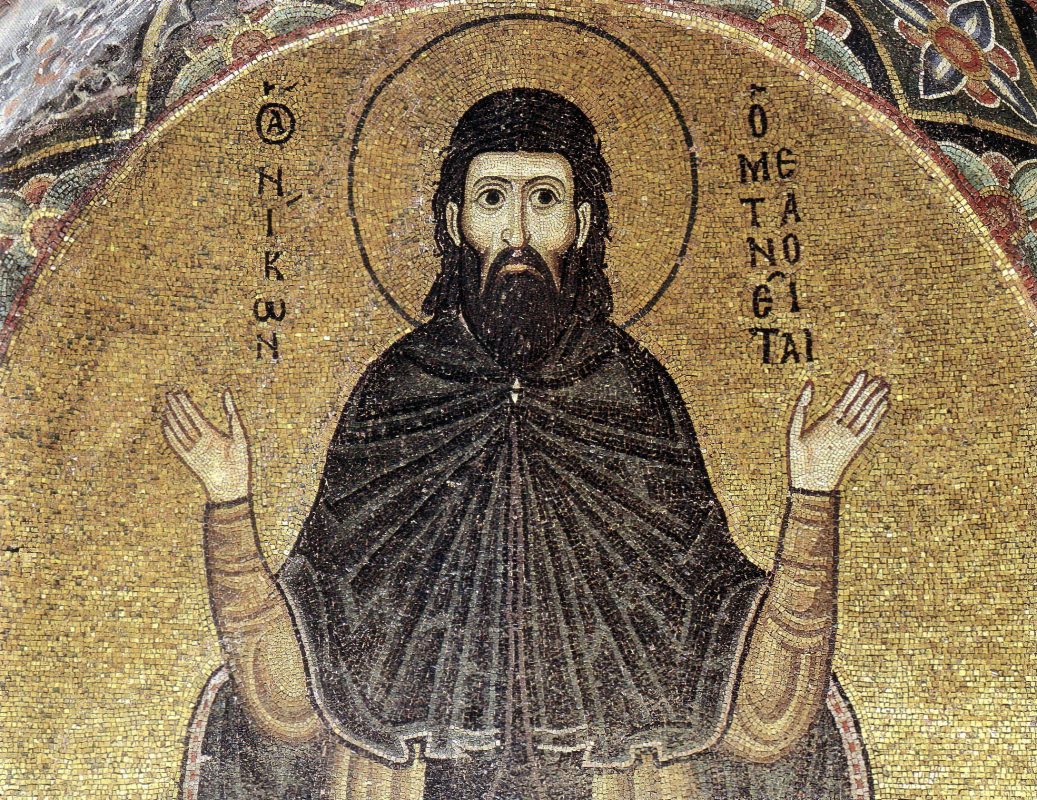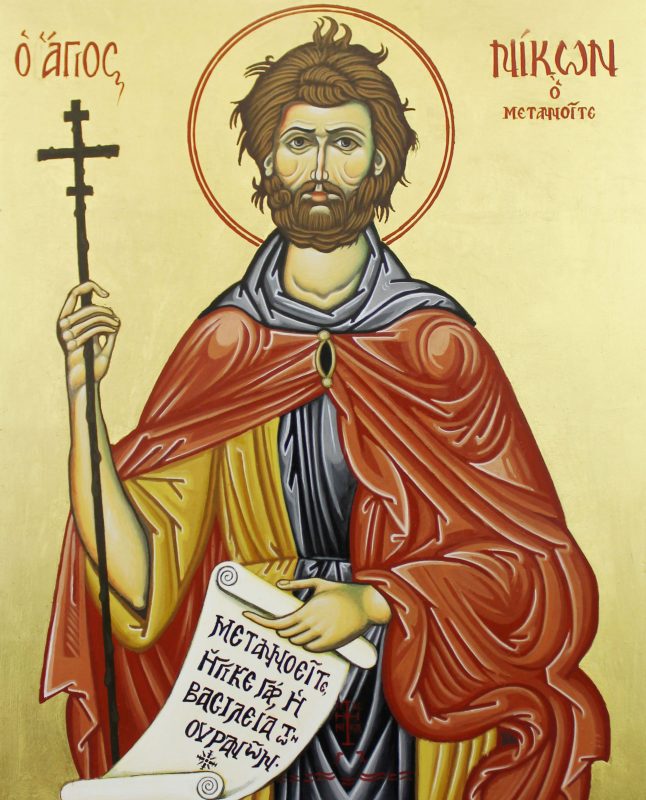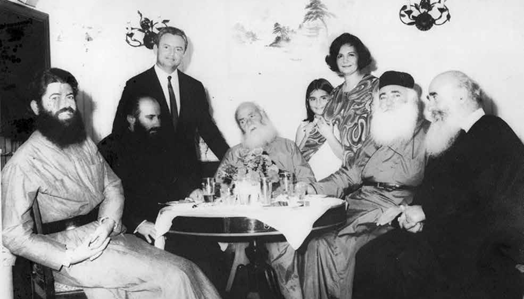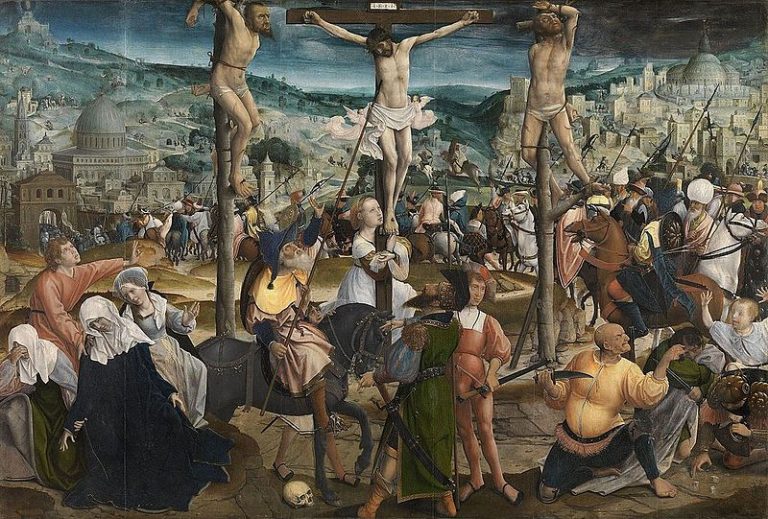Saint Nikon: repentance and mission
Saint Nikon, the so-called “Repent”, according to the synaxarist of Saint Nicodemus, came from the “land of the Armenians”.1 and was a child of a rich family. He lived in the 10th century A.D. and his real name was Nikitas2 The study of the Word of God played a decisive role in his life, since after reading the following passage – which “spoke” to his heart and rested his soul – he understood and accepted his vocation: “whosoever shall leave house, brethren, sisters, father, mother, wife, children, or children’s children in my name, shall receive a hundredfold, and shall inherit eternal life” (Mt 19:29). In a hymn of his service we read:“Thou hast forsaken thy fatherland genus of affection, O blessed begetter“. He pursued the monastic life, initially settling in a monastery. There he practised and excelled in every aspect of virtue. Fasting, vigil, prayer, obedience, hard work and liturgical life constituted his life for two whole years and became the best preparation for the next step, the missionary life. The occasion was the attempt of his tycoon father to discover him in order to exhort-bind him to give up the angelic life. Faced with the danger of falling from divine grace, he turned away from his penitential monastery and moved towards a hermit’s life. At the same time, however, he also gave himself to the preaching ministry, having his hermitage as his baseP3 He preached repentance as another John the Baptist, possessed by the same zeal, “jealous of the Baptist“.

God saw to it that his initial faith was completed, as Zygavin says: “If initial faith is due to the disposition of the one who believes, deep-rooted, firm and unshakable faith is a gift of divine grace. It is the Holy Spirit who cultivates faith. Faith is a flame, a power that impels us to the confession of the gospel, to the agony and struggle of preaching, to the sufferings of martyrdom, to death and to the resurrection.”4. Characteristically, Uncle Paul confirms the above words by writing: “I believed, I did not believe.“(2 Corinthians 4:13). He who believes feels the urgent need to speak out, to proclaim, to preach to others his faith, his love first of all for God and then for his fellow men, as St. Nikon did. He toured Crete, the Peloponnese and ended up in Sparta where he founded a large monastery. He was buried in 998 AD. His sequence is full of references to his apostolic activity such as: “O thou most excellent star, out of thee, O Father, thou hast flashed forth, hasting westward, leading all to repentance, leading the people in the light of preaching.“, “Having followed Christ, dwelling continually in cities and places, blessed art thou, we have no more, O Son of God, after Paul, a city that is past, but the future we seek.“, “Preaching, and exhorting the people to the remembrance of them that are guilty, and to the correction of their lives, when they have sinned in praying to the Lord.“. The memory of Saint Nikonos is celebrated on November 26 of each year.
Apolyticon
Sound a’. Divine Faith. Blessed is the Lacedaemon, divine urn of thy relics, a fountain of healing, and a source of salvation for all who come to thee, Father, by faith. O thou, O thou Nikon Osius, pray the Lord Christ, grant me great mercy.
Repentance and mission
He preached repentance; the blessed habit of St. Nikon offers instructively a special feature of missionary action. Today our sermons – in terms of missionary approach to people – are either apologetic in relation to other religions and denominations or emphasize certain virtues such as love, long-suffering, etc. (without, of course, wanting to say that these approaches are wrong or inferior to that of repentance). He preached repentance and through that preaching he did missionary work. Paradoxical really… how is it possible that such a sermon could have any resonance in the souls of people? Yet; it is, and very naturally so, since he was calling souls to return to their natural state, their pre-temporal relationship with their Creator, to their full rest, whether they were Christians or not. Especially for those who did not know the law of God, St. Paul aptly informs us that:“For when the Gentiles that have not the law do by nature the works of the law, not having the law themselves, they have a ticket of the law, which show the work of the law written in their hearts, with the witness of their conscience, and with all other accusers and apologists” (Rom. 2:14-15). Translated.
As for the other nations, who don’t know the law, they often do what the law requires on their own. This shows that, although they were not given the law, there is law within them. Their conduct shows that the commandments of the law are written in their hearts, and their conscience agrees with this, whose voice condemns or praises them, according to their conduct “. Regarding The Good and how each person recognizes it, St. Basil states: “Ε Let him know in the hidden yoke what things are set up for him that made us, since the nature of things may be discerned…Let no man tell thee in the day of judgment, neither let him know the good thing. The very scales themselves offer you an able discernment of good and evil… “5. But also Saint Gregory Palamas considers the individual conscience of each person as an “unimpeachable teacher“, i.e. “irrefutable teacher“6

Now, concerning repentance and its relation to mission, St Chrysostom points out.Yesterday Paul set the table for us, today Matthew, yesterday the tentmaker, today the publican, yesterday the blasphemer, today the rapist, yesterday the persecutor, today the covetous. But the blasphemer did not remain a blasphemer, but became an apostle, and the predator did not remain a predator, but became an evangelist. I mention both the former wickedness and the later virtue, that you may learn what the benefit of repentance is, that you may never despair of your salvation. Our teachers shone before their sin, but afterwards they shone by their righteousness, the publican and the blasphemer, the best fruits of wickedness. For what is the custom? Rapture lawful, violence courageous, injustice having the law for its advocate. Worse than thieves is the publican. What is customs? Violence that uses the law for its defence, that has the physician for its executioner. Do you understand what I have said? Laws are physicians, then they become executioners, for they do not heal the wound, but make it worse. What does customs mean? A shameless sin, a robbery without pretense, a thing worse than robbery. The thief at least is ashamed when he steals, while he speaks with boldness when he snatches. And yet ! This tax collector immediately became an evangelist. How and in what way? “Going on,” he says, “Jesus saw Matthew sitting in the tax office and said to him, ‘Follow me'” (Matt. 9:9). How powerful is this word ! The hook entered into him, and made the captive a soldier, and the clay gold. The hook entered into him, “and immediately he arose and followed him.” He was in the depths of wickedness, and rose to the top of virtue “7: “Let no one, therefore, despair for his salvation. Let no one despair for his salvation. Are you a perfectionist? You can be an evangelist. Are you a blasphemer? You can be an apostle. Are you a thief? You can plunder heaven. Are you a magician? You can worship the Lord. There is no sin that cannot be erased by repentance. That is why the Lord has chosen the best fruits of evil, so that one can be free from evil in the end8“9 To sum up, we missionary workers must first have lived and live in repentance, because repentance is not a decision of the moment but a decisive way of life. We have a duty, then, to speak of repentance either to Christians or to catechumens, bearing in mind the existence of conscience and the grace of God. Finally, it is imperative to highlight examples of repentance from the Bible, such as the Apostles Peter and Paul, Zacchaeus, the Isapostle Photini the Samaritan, thus highlighting repentance as possible and the missionary way of life that accompanies it as desirable.
- Nicodemus Athonite, Synaxarist, published by “Orthodox Kypseli”, vol.2, Thessaloniki 2003, p.194.
- .Paraskeva Zofrafos, Sermons of Truth and Life, vol. 10, Athens 2010, pp. 480-481.
- .Paraskeva Zofrafos, Sermons of Truth and Life, vol. 10, Athens 2010, p. 481.
- Stergios Sakkou, Apostolic passages, vol. 2, Thessaloniki 2009, p. 190
- Venedictus Ieromonachos, Basilian Treasury, published by the “Synod of Spyridon Ieromonachos”, Mount Athos 1998, p. 521
- .
- Venedictus Ieromonachos, (Chrysostomicus Amvon VI), Repentance, Confession, Fasting, Holy Communion, published by “Synodia Spyridonos Ieromonachos”, Mount Athos 2008, pp. 183-184
- .
- “Synodia Spyridon Ieromonachos”, Mount Athos 2008, p. 184.




